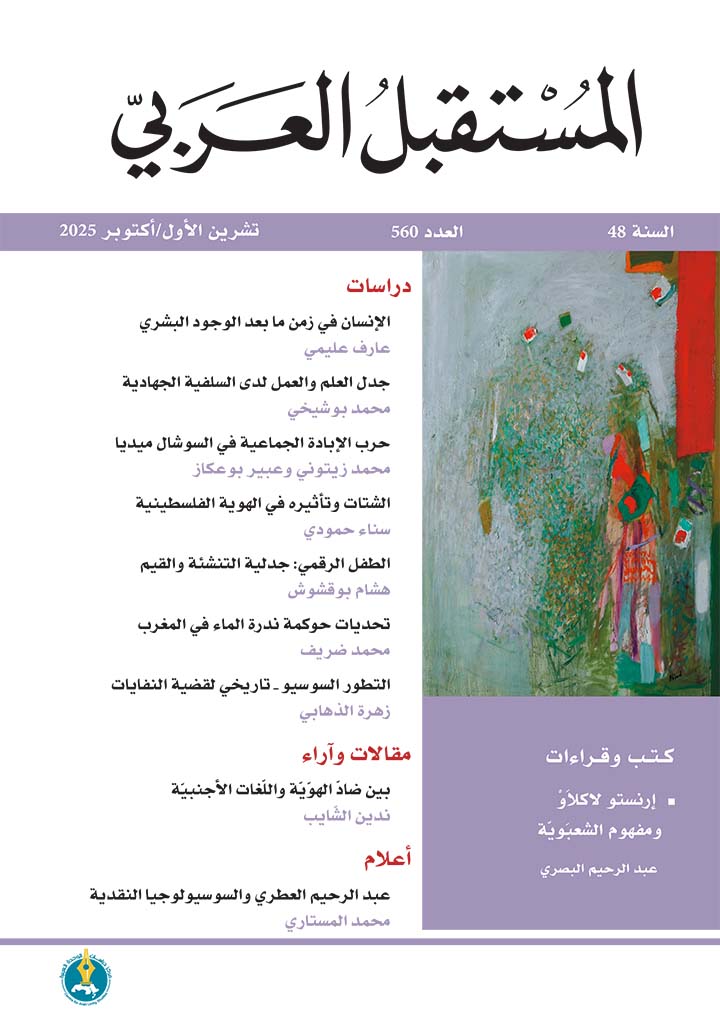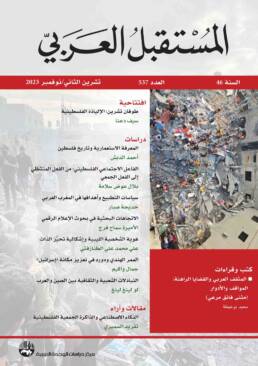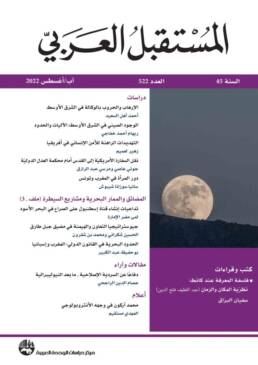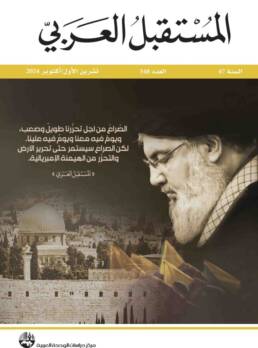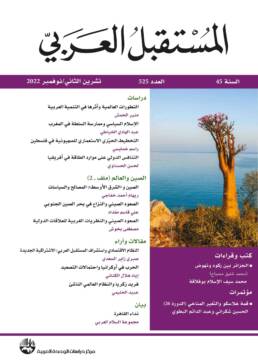Studies
⬜ Humans in the Era of Post-Human Existence: Towards Building
a New System of Coexistence Between Humans and
Robots Aref Alimi 7
The rapid advancement of intelligent machines in various fields has led many scientists to feel an impending danger threatening the human being in the coming era—one that puts human existence on Earth at risk. In response, legislative bodies have moved to enact laws that curb the unrestrained development of smart machines. Several international organizations are working to exclude such machines from positions of decision-making in military, environmental, and existential matters.
In the face of these looming dangers in an age of digital dominance and the intelligent enslavement of humans, it is worth asking: What remains for humanity in the era of post-human existence? And what is the relevance of values, religions, and legislations in the presence of intelligent machines governed solely by cold, materialistic, metallic values in terms of feeling, and by control in terms of technological achievement?
Keywords: Human, Artificial Intelligence, Robot, Digital Culture, Digital Employment, Cybersecurity, Robotic Human Cloning.
⬜ A Non-Combatant Issues No Fatwa to a Mujahid: The Debate
Between Knowledge and Action in the Jihadi-Salafi
Framework Mohamed Bouchikhi 25
With the intensification of the international war on jihadist organizations since the early 2000s, the phrase «A non-combatant issues no fatwa to a mujahid» became widespread. It eventually came to define the relationship between mujahideen and scholars, serving as a reference framework for legal (fiqhi) practices on the battlefield.
Although this phrase is a newly invented innovation — with no basis in scholarly tradition, not found in any jurisprudential discourse, and not recognized as a foundational legal principle — it gained popularity due to the pervasive sense of weakness felt by both Islamic elites and the broader public in the face of accumulating hardships and successive defeats.
This study aims to explore the origins of this phrase, digging into its ideological foundations, tracing how it infiltrated Salafi circles, and analyzing the ways it has been employed — along with its consequences — in shaping the ongoing debate between knowledge and action within the jihadi-Salafi framework.
Keywords: Jihadi Salafism, Scholars, Sayyid Qutb, Sayyid Imam, Jihad, Islamic Jurisprudence (Fiqh).
⬜ The Al-Aqsa Flood in the Media: The War of Genocide on
Social Media Mohamed Zaitouni & Abeer Bouakkaz 46
This study explores the classification of the violence committed by Israel in the Gaza Strip as a crime of genocide, particularly in the context of Israel’s promotion of its military actions as legitimate acts of self-defense.
The study sheds light on how social media influences global public opinion and how this, in turn, affects the Israeli narrative. It argues that social media has played a pivotal role by diversifying sources of information, making facts on the ground in Gaza more accessible, and exposing the reality of events to the global public.
This shift in narrative and accessibility has presented challenges to Palestinian digital content, as seen in repeated efforts to suppress or restrict it on social media platforms.
Keywords: Israel, Gaza Strip, Genocide, Social Media, Global Public Opinion.
⬜ The Palestinian Diaspora and Its Impact on Palestinian Identity
(Case Study: Palestinians in Denmark and Sweden Sanaa Hammoudi 61
Since the Nakba of 1948, most Palestinian refugees have lived in a constant state of instability in refugee camps — particularly in Lebanon, where they suffer from recurring wars and the denial of civil rights. This situation has pushed many to seek safer and more stable refuges outside Lebanon.
This paper examines the case of the Palestinian diaspora in Denmark and Sweden, where many Palestinians found a safe haven and were granted asylum between the mid-1980s and early 1990s. The study focuses on the causes and consequences of this diaspora, particularly in terms of its impact on Palestinian identity — especially regarding the integration experiences of the generations born in these two countries.
Keywords: Palestinian Diaspora, Forced Migration, Integration, Denmark, Sweden.
⬜ The Digital Child: The Dialectic of Upbringing and Values Between
the Family and the Platform Hicham Boukchouch 81
This study explores the impact of digital media on the socialization process of children, in light of the ongoing transformations in traditional family roles. With the increasing presence of digital platforms such as YouTube and TikTok, and the growing interaction with video games and digital narratives, sharp tensions have emerged between the value systems that families and educational institutions aim to instill, and those transmitted to the child through their digital interactions.
The study aims to analyze these tensions and deconstruct the conflicting narratives that are reshaping the child’s awareness and identity. It also examines how the digital world has contributed to redefining the traditional roles of the family, raising important questions about the limits of parental authority in the age of the connected child.
Keywords: Family, Socialization, Digital Media, Values, Narratives, Child Identity, Real-Virtual Space.
⬜ Challenges of Water Scarcity Governance in Morocco in Light of the
«Tragedy of the Commons» Thesis Mohamed Drif 100
Water scarcity has become a major challenge for Morocco in recent years, significantly affecting the country’s social, economic, and environmental dimensions. Despite the fact that drought has become a structural reality in Morocco, numerous reports highlight serious issues in the management and governance of this vital resource.
This paper seeks to address the problem of water scarcity in Morocco and its impact on the governance of this essential resource. The research focuses on how personal interests and the weakness of governance systems in water resource management have contributed to the worsening of water stress, analyzed through the lens of the «Tragedy of the Commons» — a keytheoretical framework for understanding the water governance crisis in Morocco.
Keywords: Morocco, Water Scarcity, Tragedy of the Commons, Personal Interests, Governance System.
⬜ The Socio-Historical Evolution of the Waste Issue: From the Middle
Ages to the Industrial Era Zahra Al-Dhahabi 113
This paper aims to trace the issue of waste as both a historical and social problem, highlighting its severity and impact across different periods. It begins with the Black Death epidemic, which claimed over 25 million lives in Europe during the Middle Ages, then examines how waste was managed in the Islamic city during the same era. The study then explores the dangerous implications of waste in the industrial society, which saw excessive consumption, and reflects on the new environmental threats caused by waste.
These threats have destroyed many features of wild and marine life, led to the extinction of species in oceans and waterways, claimed the lives of numerous wild animals, harmed the health of millions of people, and contributed significantly to global warming.
Keywords: Waste, Western Countries, Middle Ages, Islamic City, Industrial Society.
⬛ Articles & Opinions
⬜ Between the Identity Letter «Ḍād» and Foreign
Languages Nadine Al-Shayeb 131
⬛ Flags
⬜ Abderrahim El-Atri and the Methodology of Critical
Sociology Mohamed Al-Mestari 139
⬛ Books & Readings
⬜ Ernesto Laclau: Toward a Philosophical Foundation
of Populism Abderrahim Al-Basri 146
⬜ Selected Arabic and Foreign Books
and Research Reports Gaby El-Khoury 157
Arabic Books: Gas of the Eastern Mediterranean in Light of Regional Military Conflicts; Security Assistance in the Middle East: Protection or Control?; The Power of Negotiation: Principles and Rules of Political and Diplomatic Negotiations; Democratic Transition in Tunisia (2011–2021): Critical Reviews of the Process and the Roles.
English Books: The Cambridge Handbook of the Law, Ethics and Policy of Artificial Intelligence; Being Jewish After the Destruction of Gaza: A Reckoning; King of Kings: The Iranian Revolution: A Story of Hubris, Delusion and Catastrophic Miscalculation; Colonialism Devours Itself: The Waning of Françafrique.
Research Reports: «Jets Over Estonia Are Putin’s Latest Check of U.S. and NATO Resolve»; «Will Saudi Arabia’s New Defense Agreement with Pakistan Have Proliferation Consequences?»
Add a review
You must be logged in to post a review.

